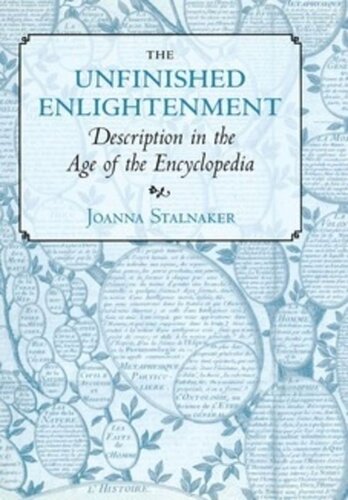

Most ebook files are in PDF format, so you can easily read them using various software such as Foxit Reader or directly on the Google Chrome browser.
Some ebook files are released by publishers in other formats such as .awz, .mobi, .epub, .fb2, etc. You may need to install specific software to read these formats on mobile/PC, such as Calibre.
Please read the tutorial at this link: https://ebookbell.com/faq
We offer FREE conversion to the popular formats you request; however, this may take some time. Therefore, right after payment, please email us, and we will try to provide the service as quickly as possible.
For some exceptional file formats or broken links (if any), please refrain from opening any disputes. Instead, email us first, and we will try to assist within a maximum of 6 hours.
EbookBell Team

4.8
14 reviewsIn The Unfinished Enlightenment, Joanna Stalnaker offers a fresh look at the French Enlightenment by focusing on the era's vast, collective attempt to compile an ongoing and provisional description of the world. Through a series of readings of natural histories, encyclopedias, scientific poetry, and urban topographies, the book uncovers the deep epistemological and literary tensions that made description a central preoccupation for authors such as Buffon, Bernardin de Saint-Pierre, Diderot, Delille, and Mercier.
Stalnaker argues that Enlightenment description was the site of competing truth claims that would eventually resolve themselves in the modern polarity between literature and science. By the mid-nineteenth century, the now habitual association between description and the novel was already firmly anchored in French culture, but just a century earlier, in the diverse network of articles on description in Diderot and d'Alembert's Encyclopédie and in the works derived from it, there was not a single mention of the novel. Instead, we find articles on description in natural history, geometry, belles-lettres, and poetry. Stalnaker builds on the premise that the tendency to view description as the inevitable (and subservient) partner of narration—rather than as a universal tool for making sense of knowledge in all fields—has obscured the central place of description in Enlightenment discourse. As a result, we have neglected some of the most original and experimental works of the eighteenth century.